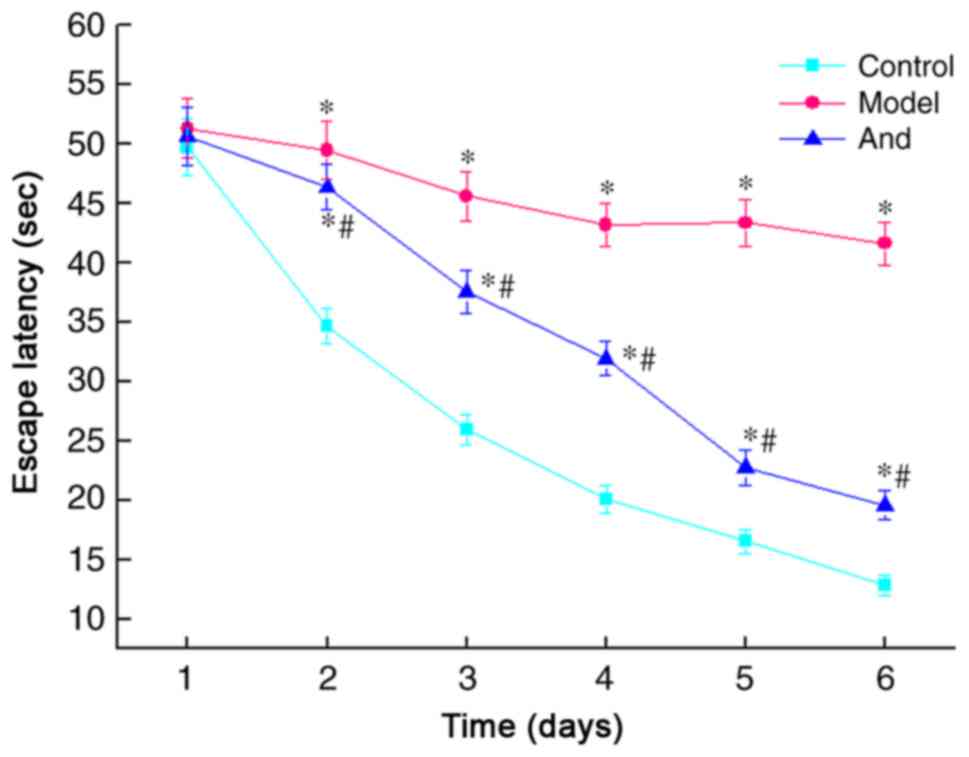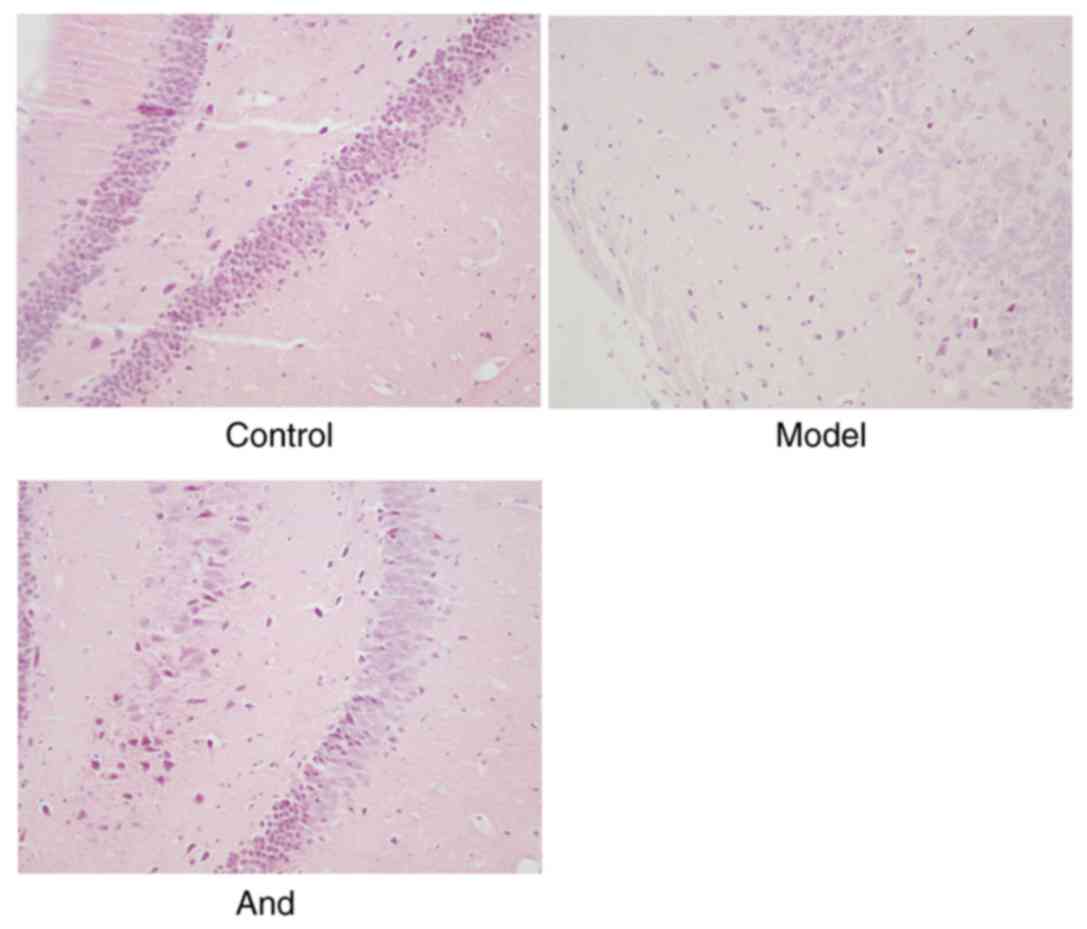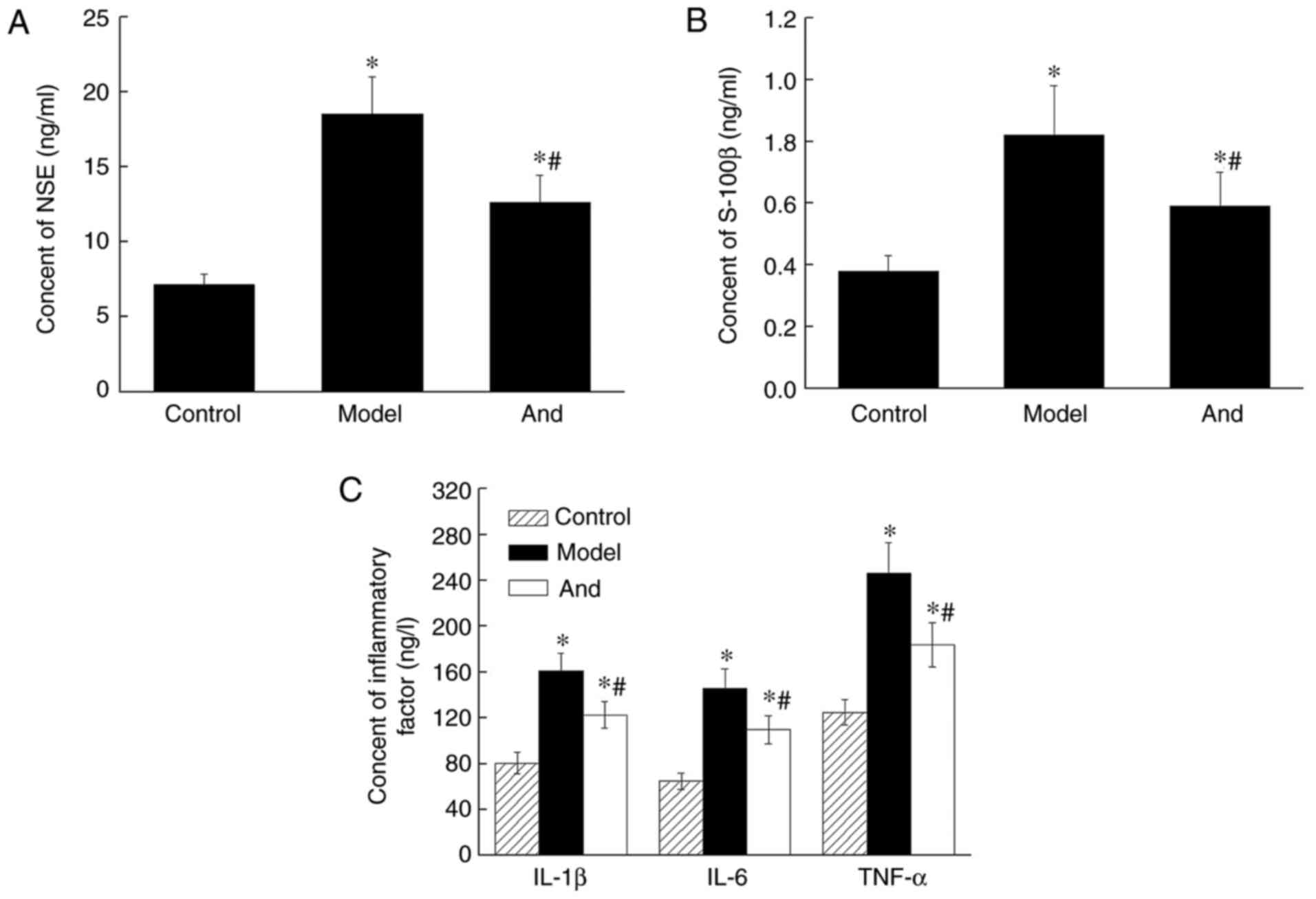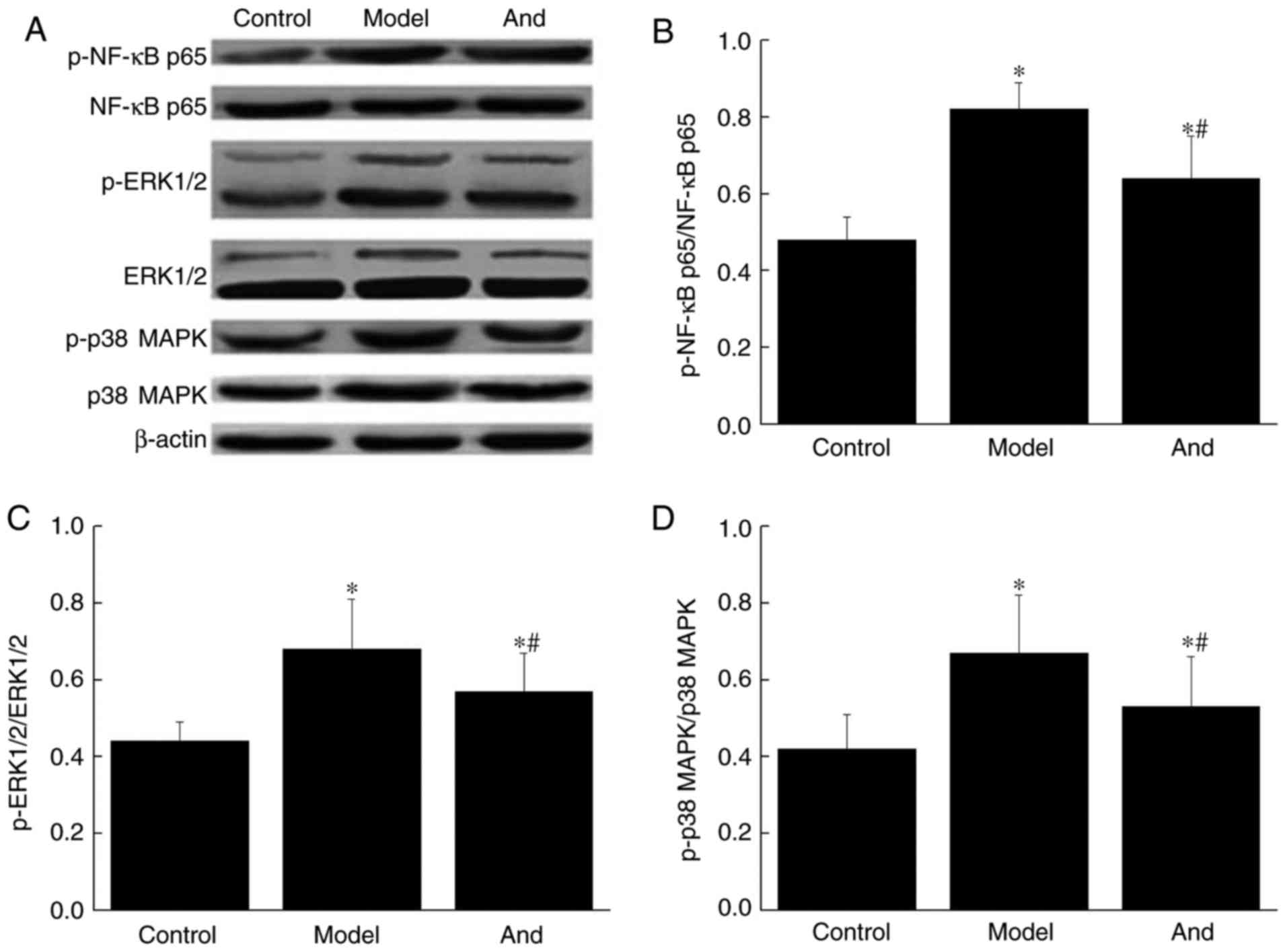|
1
|
Rundshagen I: Postoperative cognitive
dysfunction. Dtsch Arztebl Int. 111:119–125. 2014.PubMed/NCBI
|
|
2
|
Bedford PD: Adverse cerebral effects of
anaesthesia on old people. Lancet. 269:259–263. 1955. View Article : Google Scholar : PubMed/NCBI
|
|
3
|
Krenk L, Rasmussen LS and Kehlet H: New
insights into the pathophysiology of postoperative cognitive
dysfunction. Acta Anaesthesiol Scand. 54:951–956. 2010. View Article : Google Scholar : PubMed/NCBI
|
|
4
|
Hovens IB, van Leeuwen BL, Mariani MA,
Kraneveld AD and Schoemaker RG: Postoperative cognitive dysfunction
and neuroinflammation; cardiac surgery and abdominal surgery are
not the same. Brain Behav Immun. 54:178–193. 2016. View Article : Google Scholar : PubMed/NCBI
|
|
5
|
Rasmussen LS: Postoperative cognitive
dysfunction: Incidence and prevention. Best Pract Res Anaesthesiol.
20:315–330. 2006. View Article : Google Scholar
|
|
6
|
Selnes OA, McKhann GM, Borowicz LM Jr and
Grega MA: Cognitive and neurobehavioral dysfunction after cardiac
bypass procedures. Neurol Clin. 24:133–145. 2006. View Article : Google Scholar : PubMed/NCBI
|
|
7
|
Evered L, Silbert B, Scott DA, Ames D,
Maruff P and Blennow K: Cerebrospinal fluid biomarker for Alzheimer
disease predicts postoperative cognitive dysfunction.
Anesthesiology. 124:353–361. 2016. View Article : Google Scholar : PubMed/NCBI
|
|
8
|
Arora SS, Gooch JL and Garcia PS:
Postoperative cognitive dysfunction, Alzheimer's disease, and
anesthesia. Int J Neurosci. 124:236–242. 2014. View Article : Google Scholar : PubMed/NCBI
|
|
9
|
Hussain M, Berger M, Eckenhoff RG and
Seitz DP: General anesthetic and the risk of dementia in elderly
patients: Current insights. Clin Interv Aging. 9:1619–1628.
2014.PubMed/NCBI
|
|
10
|
Finnerty CC, Mabvuure NT, Ali A, Kozar RA
and Herndon DN: The surgically induced stress response. JPEN J
Parenter Enteral Nutr. 37 5 Suppl:21S–29S. 2013. View Article : Google Scholar : PubMed/NCBI
|
|
11
|
van Harten AE, Scheeren TW and Absalom AR:
A review of postoperative cognitive dysfunction and
neuroinflammation associated with cardiac surgery and anaesthesia.
Anaesthesia. 67:280–293. 2012. View Article : Google Scholar : PubMed/NCBI
|
|
12
|
Hovens IB, Schoemaker RG, van der Zee EA,
Absalom AR, Heineman E and van Leeuwen BL: Postoperative cognitive
dysfunction: Involvement of neuroinflammation and neuronal
functioning. Brain Behav Immun. 38:202–210. 2014. View Article : Google Scholar : PubMed/NCBI
|
|
13
|
Barrientos RM, Hein AM, Frank MG, Watkins
LR and Maier SF: Intracisternal interleukin-1 receptor antagonist
prevents postoperative cognitive decline and neuroinflammatory
response in aged rats. J Neurosci. 32:14641–14648. 2012. View Article : Google Scholar : PubMed/NCBI
|
|
14
|
Cibelli M, Fidalgo AR, Terrando N, Ma D,
Monaco C, Feldmann M, Takata M, Lever IJ, Nanchahal J, Fanselow MS
and Maze M: Role of interleukin-1beta in postoperative cognitive
dysfunction. Ann Neurol. 68:360–368. 2010. View Article : Google Scholar : PubMed/NCBI
|
|
15
|
Jiang P, Ling Q, Liu H and Tu W:
Intracisternal administration of an interleukin-6 receptor
antagonist attenuates surgery-induced cognitive impairment by
inhibition of neuroinflammatory responses in aged rats. Exp Ther
Med. 9:982–986. 2015.PubMed/NCBI
|
|
16
|
Wan Y, Xu J, Ma D, Zeng Y, Cibelli M and
Maze M: Postoperative impairment of cognitive function in rats: A
possible role for cytokine-mediated inflammation in the
hippocampus. Anesthesiology. 106:436–443. 2007. View Article : Google Scholar : PubMed/NCBI
|
|
17
|
Terrando N, Monaco C, Ma D, Foxwell BM,
Feldmann M and Maze M: Tumor necrosis factor-alpha triggers a
cytokine cascade yielding postoperative cognitive decline. Proc
Natl Acad Sci USA. 107:pp. 20518–20522. 2010, View Article : Google Scholar : PubMed/NCBI
|
|
18
|
Peng L, Xu L and Ouyang W: Role of
peripheral inflammatory markers in postoperative cognitive
dysfunction (POCD): A meta-analysis. PLoS One. 8:e796242013.
View Article : Google Scholar : PubMed/NCBI
|
|
19
|
Yirmiya R and Goshen I: Immune modulation
of learning, memory, neural plasticity and neurogenesis. Brain
Behav Immun. 25:181–213. 2011. View Article : Google Scholar : PubMed/NCBI
|
|
20
|
Tang JX, Baranov D, Hammond M, Shaw LM,
Eckenhoff MF and Eckenhoff RG: Human Alzheimer and inflammation
biomarkers after anesthesia and surgery. Anesthesiology.
115:727–732. 2011. View Article : Google Scholar : PubMed/NCBI
|
|
21
|
Cortese GP, Barrientos RM, Maier SF and
Patterson SL: Aging and a peripheral immune challenge interact to
reduce mature brain-derived neurotrophic factor and activation of
TrkB, PLCgamma1, and ERK in hippocampal synaptoneurosomes. J
Neurosci. 31:4274–4279. 2011. View Article : Google Scholar : PubMed/NCBI
|
|
22
|
Fidalgo AR, Cibelli M, White JP, Nagy I,
Noormohamed F, Benzonana L, Maze M and Ma D: Peripheral orthopaedic
surgery down-regulates hippocampal brain-derived neurotrophic
factor and impairs remote memory in mouse. Neuroscience.
190:194–199. 2011. View Article : Google Scholar : PubMed/NCBI
|
|
23
|
Wintachai P, Kaur P, Lee RC, Ramphan S,
Kuadkitkan A, Wikan N, Ubol S, Roytrakul S, Chu JJ and Smith DR:
Activity of andrographolide against chikungunya virus infection.
Sci Rep. 5:141792015. View Article : Google Scholar : PubMed/NCBI
|
|
24
|
Peng S, Hang N, Liu W, Guo W, Jiang C,
Yang X, Xu Q and Sun Y: Andrographolide sulfonate ameliorates
lipopolysaccharide-induced acute lung injury in mice by
down-regulating MAPK and NF-κB pathways. Acta Pharm Sin B.
6:205–211. 2016. View Article : Google Scholar : PubMed/NCBI
|
|
25
|
Zhu T, Wang DX, Zhang W, Liao XQ, Guan X,
Bo H, Sun JY, Huang NW, He J, Zhang YK, et al: Andrographolide
protects against LPS-induced acute lung injury by inactivation of
NF-κB. PLoS One. 8:e564072013. View Article : Google Scholar : PubMed/NCBI
|
|
26
|
Li FX and Li SS: Effects of
andrographolide on the activation of mitogen activated protein
kinases and nuclear factor-κB in mouse peritoneal
macrophage-derived foam cells. Chin J Integr Med. 18:391–394. 2012.
View Article : Google Scholar : PubMed/NCBI
|
|
27
|
Kotekar N, Kuruvilla CS and Murthy V:
Post-operative cognitive dysfunction in the elderly: A prospective
clinical study. Indian J Anaesth. 58:263–268. 2014. View Article : Google Scholar : PubMed/NCBI
|
|
28
|
Hovens IB, van Leeuwen BL, Nyakas C,
Heineman E, van der Zee EA and Schoemaker RG: Postoperative
cognitive dysfunction and microglial activation in associated brain
regions in old rats. Neurobiol Learn Mem. 118:74–79. 2015.
View Article : Google Scholar : PubMed/NCBI
|
|
29
|
Zaheer S, Beg M, Rizvi I, Islam N, Ullah E
and Akhtar N: Correlation between serum neuron specific enolase and
functional neurological outcome in patients of acute ischemic
stroke. Ann Indian Acad Neurol. 16:504–508. 2013. View Article : Google Scholar : PubMed/NCBI
|
|
30
|
Song WA, Liu X, Tian XD, Wang W, Liang CY,
Zhang T, Guo JT, Peng YH and Zhou NK: Utility of squamous cell
carcinoma antigen, carcinoembryonic antigen, Cyfra 21–1 and neuron
specific enolase in lung cancer diagnosis: A prospective study from
China. Chin Med J (Engl). 124:3244–3248. 2011.PubMed/NCBI
|
|
31
|
Yao JC, Pavel M, Phan AT, Kulke MH, Hoosen
S, St Peter J, Cherfi A and Öberg KE: Chromogranin A and
neuron-specific enolase as prognostic markers in patients with
advanced pNET treated with everolimus. J Clin Endocrinol Metab.
96:3741–3749. 2011. View Article : Google Scholar : PubMed/NCBI
|
|
32
|
Schmidt FM, Mergl R, Stach B, Jahn I,
Gertz HJ and Schönknecht P: Elevated levels of cerebrospinal fluid
neuron-specific enolase (NSE) in Alzheimer's disease. Neurosci
Lett. 570:81–85. 2014. View Article : Google Scholar : PubMed/NCBI
|
|
33
|
Neselius S, Brisby H, Theodorsson A,
Blennow K, Zetterberg H and Marcusson J: CSF-biomarkers in Olympic
boxing: Diagnosis and effects of repetitive head trauma. PLoS One.
7:e336062012. View Article : Google Scholar : PubMed/NCBI
|
|
34
|
Mondello S, Linnet A, Buki A, Robicsek S,
Gabrielli A, Tepas J, Papa L, Brophy GM, Tortella F, Hayes RL and
Wang KK: Clinical utility of serum levels of ubiquitin C-terminal
hydrolase as a biomarker for severe traumatic brain injury.
Neurosurgery. 70:666–675. 2012.PubMed/NCBI
|
|
35
|
Zurek J and Fedora M: The usefulness of
S100B, NSE, GFAP, NF-H, secretagogin and Hsp70 as a predictive
biomarker of outcome in children with traumatic brain injury. Acta
Neurochir (Wien). 154:93–103. 2012. View Article : Google Scholar : PubMed/NCBI
|
|
36
|
Palmio J, Huuhka M, Laine S, Huhtala H,
Peltola J, Leinonen E, Suhonen J and Keränen T: Electroconvulsive
therapy and biomarkers of neuronal injury and plasticity: Serum
levels of neuron-specific enolase and S-100b protein. Psychiatry
Res. 177:97–100. 2010. View Article : Google Scholar : PubMed/NCBI
|
|
37
|
González-García S, González-Quevedo A,
Fernández-Concepción O, Peña-Sánchez M, Menéndez-Saínz C,
Hernández-Díaz Z, Arteche-Prior M, Pando-Cabrera A and
Fernández-Novales C: Short-term prognostic value of serum neuron
specific enolase and S100B in acute stroke patients. Clin Biochem.
45:1302–1307. 2012. View Article : Google Scholar : PubMed/NCBI
|
|
38
|
Yamauchi S, Ito H and Miyajima A:
IkappaBeta, a nuclear IkappaB protein, positively regulates the
NF-kappaB-mediated expression of proinflammatory cytokines. Proc
Natl Acad Sci USA. 107:pp. 11924–11929. 2010, View Article : Google Scholar : PubMed/NCBI
|


















